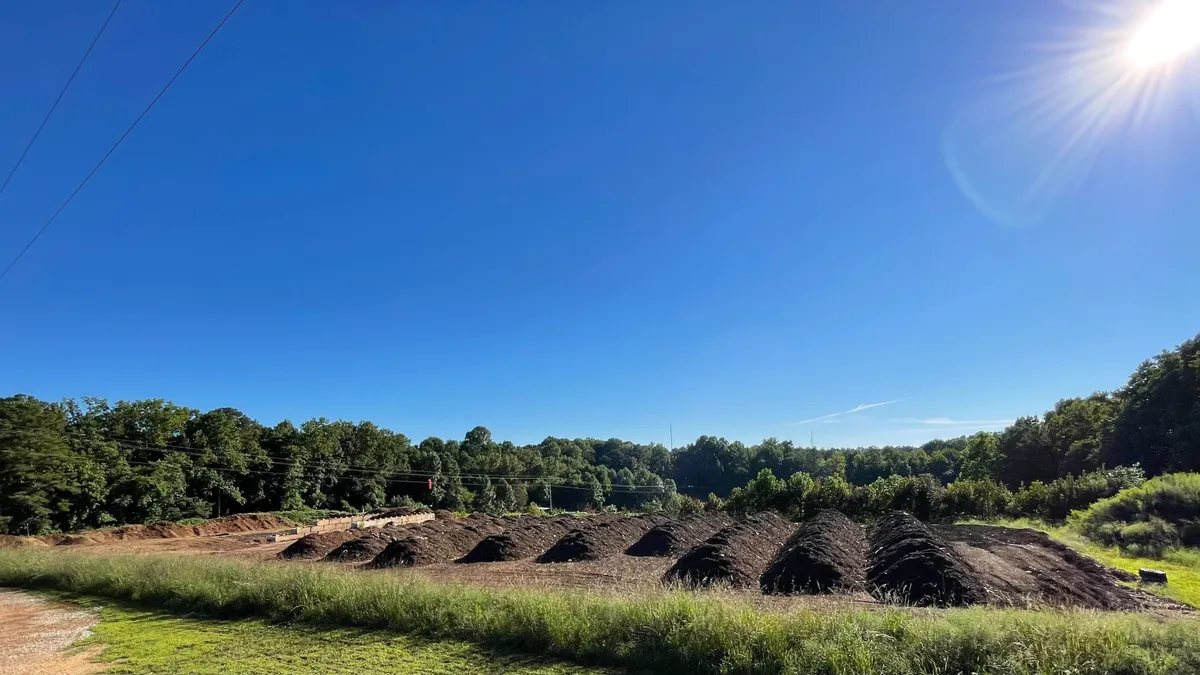Dive Brief:
- The new Georgia Composting Council is planning to boost composting in the state via a combination of education, partnerships and legislative advocacy. The group’s members, which include CompostNow and ERTH Products, also plan to continue their work supporting agriculture in the state with their finished product.
- Food waste in Georgia totals more than 800,000 tons, about 12% of landfilled waste in the state. Nearly half of that waste comes from the Atlanta area, according to an announcement from the group.
- David Paull, chief impact officer with CompostNow and a member of the group, said his company has worked to navigate a difficult permitting environment in the state, and plan to push for a simpler process for future composting facilities in Georgia.
Dive Insight:
This is the U.S. Composting Council's sixteenth state chapter, which is working to advance the use of composting as a means of beneficially reusing organic waste. The chapter was formed under the auspices of the Georgia Recycling Coalition.
Gloria Hardegree, executive director of the coalition, said in a February statement the new organization would “elevate sustainable materials management and improve soil health via composting organic materials” in facilities of all sizes, “assuring all Georgians have access to composting options and education.”
CompostNow was founded in North Carolina and now serves four states, including South Carolina and Ohio. It mainly serves the Atlanta metro area in Georgia. The company began collecting scraps in the Atlanta market in 2012 and at first relied on a network of farms with small composting operations to process the residuals.
Over time, CompostNow outgrew that network. But existing permits available in the state either allowed for small, backyard style composting or a large-scale industrial facility, neither of which served the kind of mid-sized operation CompostNow wanted to create. The company began working with several partners, including the nonprofit Food Well Alliance, U.S. EPA Region 4, Georgia Tech University and the Georgia Recycling Coalition to create and secure a new type of permit for a composting facility in the Atlanta area.
“Part of the challenge in the state of Georgia for infrastructure to develop was that the composting rules and regulations were really prohibitive for a smaller class facility to get started,” Paull said. “There was very little middle ground.”
CompostNow’s Georgia facility currently handles about 4,000 tons of green waste and 2,000 tons of food waste annually. But Paull believes there’s plenty more potential in the area for composting.
In 2022, the city received a roughly $300,000 Composting and Food Waste Reduction grant from the U.S. Department of Agriculture. CompostNow is setting up drop-off sites and collecting the waste in a partnership with the city funded by the grant, Paull said.
As part of a two-year pilot funded by the grant, CompostNow is also returning finished compost to urban farmers, with a focus on Black and Indigenous partners, in partnership with Food Well Alliance.
"More and more cities are wanting to make this happen," Paull said. "The city of Atlanta has been unique in some ways because a lot of this work from them has been led from the standpoint of urban agriculture."
Additional composters are also looking forward to growing support for composting in the state of Georgia. Wayne King, founder of compost manufacturer ERTH Products, said in a statement the creation of a local chapter of the U.S. Composting Council would “provide the necessary resources to grow infrastructure development in Georgia with an eye toward uniformity across state lines.”
Paull said the first year of the chapter will mostly be about building education and awareness to communities around the state. But he said the group already has its eye on legislative priorities, including opening up agriculturally zoned lands to composting, and getting composting included in local and regional waste management plans.
“We're at this juncture of where professionalization of the industry is really important,” Paull said. “All of those beneficial things that compost achieves should have an industry body and voice supporting it within the state.”











